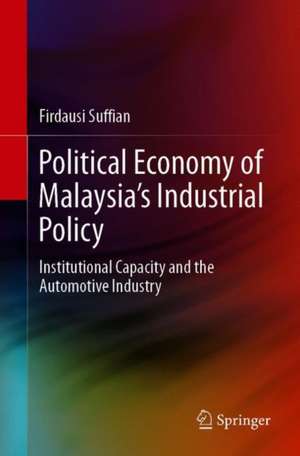Political Economy of Malaysia’s Industrial Policy: Institutional Capacity and the Automotive Industry
Autor Firdausi Suffianen Limba Engleză Paperback – 23 feb 2021
This book examines the national automotive policy in Malaysia to help readers gain an understanding of the country’s industrial policy-making processes. Addressing a gap in analysis of the political economy of the national automotive policy, the research presented combines the new institutional theory and the developmental state approach to provide new insights into elite policymakers’ measures to shield domestic automotive enterprises from pro-market reforms. The formation of the national car project marks a turning point for Malaysia's industrial development as a country, which it envisions will lead to it becoming a major player in the global automotive market. However, the domestic institutional factors embedded in ethno-economic interests and patronage constrain national car-makers, limiting their potential to grow, and instead causing a slowdown in the industry.
Allowing readers to understand the background to Malaysia’s heavy industrialisation programme and the birth of its national car projects, this book critically discusses the significance of institutional context in policy outcomes, and highlights how institutions and policies have impact growth or decline. It is a valuable resource relevant to analysts, researchers and students who are interested in the political economy of the national industrial policy and automotive industry in Malaysia and beyond.
Preț: 575.41 lei
Preț vechi: 676.96 lei
-15% Nou
Puncte Express: 863
Preț estimativ în valută:
110.15€ • 113.29$ • 91.39£
110.15€ • 113.29$ • 91.39£
Carte tipărită la comandă
Livrare economică 18 februarie-04 martie
Preluare comenzi: 021 569.72.76
Specificații
ISBN-13: 9789813369009
ISBN-10: 9813369000
Pagini: 131
Ilustrații: XIV, 131 p. 5 illus., 3 illus. in color.
Dimensiuni: 155 x 235 mm
Greutate: 0.45 kg
Ediția:1st ed. 2021
Editura: Springer Nature Singapore
Colecția Springer
Locul publicării:Singapore, Singapore
ISBN-10: 9813369000
Pagini: 131
Ilustrații: XIV, 131 p. 5 illus., 3 illus. in color.
Dimensiuni: 155 x 235 mm
Greutate: 0.45 kg
Ediția:1st ed. 2021
Editura: Springer Nature Singapore
Colecția Springer
Locul publicării:Singapore, Singapore
Cuprins
Introduction.- Theoretical framework.- Malaysia automotive policy and industrial policy.- The political economy of the national car project.- Political economy analysis of the national automotive industry.- Conclusion.
Notă biografică
Firdausi Suffian is a Senior Lecturer at the Faculty of Administrative Science and Policy Studies, Universiti Teknologi MARA (UiTM), Sabah Campus. He obtained his PhD from the University of Bristol, United Kingdom, in 2018. He holds a Master’s degree in Public Policy, specialising in policy analysis, from the Australia National University (ANU) and Crawford Schools of Economics and Government, and a Bachelor’s degree in Administrative Science (first class honours) from University Teknologi MARA, Malaysia. His main research interests include various political-economics-related issues, such as the political economy of economic development, and the role of institutions and industrial policy. Firdausi is a visiting lecturer for the Asia-Pacific postgraduate programme at Mondragon University, Spain, and he was formerly a teaching assistant at the University of Bristol. Outside of academia, he has also served as a consultant to the United Nations Children’s Fund overseeing documented andundocumented children in Sabah in East Malaysia. He is also an Associate Research Fellow for Malaysia Institute of Economic Research one of the leading thinking tank group in Malaysia.
Textul de pe ultima copertă
This book examines the national automotive policy in Malaysia to help readers gain an understanding of the country’s industrial policy-making processes. Addressing a gap in analysis of the political economy of the national automotive policy, the research presented combines the new institutional theory and the developmental state approach to provide new insights into elite policymakers’ measures to shield domestic automotive enterprises from pro-market reforms. The formation of the national car project marks a turning point for Malaysia's industrial development as a country, which it envisions will lead to it becoming a major player in the global automotive market. However, the domestic institutional factors embedded in ethno-economic interests and patronage constrain national car-makers, limiting their potential to grow, and instead causing a slowdown in the industry.
Allowing readers to understand the background to Malaysia’s heavy industrialisation programme and the birth of its national car projects, this book critically discusses the significance of institutional context in policy outcomes, and highlights how institutions and policies have impact growth or decline. It is a valuable resource relevant to analysts, researchers and students who are interested in the political economy of the national industrial policy and automotive industry in Malaysia and beyond.
Caracteristici
Explores the ‘behind the scenes’ politics of Malaysia industrial policy-making processes Analyses the political economy of Malaysia’s heavy industrialisation program from the perspective of policymakers Highlights Malaysia's unique industrial development strategy with its national car projects
